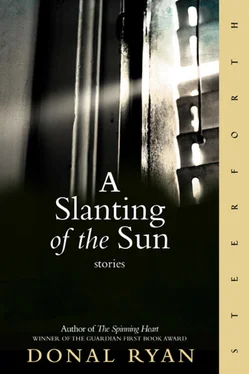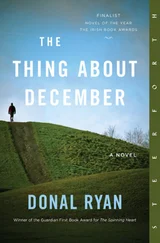Days and nights coiled themselves together. My father did not return to pay my mother’s cousin for my keep. But he didn’t care; my visitors paid handsomely. Somewhere in the tangle of time, towards spring I think, a policeman came to the stoop. A truck idled on the road, waiting. My mother’s cousin raised himself slowly, his eyes wide with alarm. He hissed at me to stay behind the bead curtain. The policeman had a rifle strapped to him; he held it before him, lengthways across his chest, as though to show my mother’s cousin the bulk and the weight of it, as though to intimate the damage it could do to the flesh and the bones of his body. I allowed my heart to swell a little with hope. I watched through the beads as the policeman spoke in a flat tone, all the time with the rifle resting on his upturned hands and raised slightly out from him, like a man proffering an infant in church for blessing. But my heart shrank again as he hung his rifle from the nail on the back wall of my tiny room and turned smiling towards me, that familiar hunger lighting his eyes. I heard my mother’s cousin’s low laugh, the relief in it and the delighted amazement, and the noise of metal scraping on metal as he opened his moneybox.
I stayed in that house until the day my mother’s cousin stood burning on the street outside. A tyre had been placed over his head to rest on his broad shoulders and it was doused in petrol and set alight. His hands were tied high behind him. He spun in a small circle for a while. His screams were shrill, piercing; they pained me. The neighbours and the dogs stood still to watch. Some men grinned; others kicked dust into tiny plumes and looked at the ground or sky. Flames licked my mother’s cousin’s face and melted his eyes. He died on his knees, slumped to one side, his fleshless face melded with the livid wires that remained when the rubber had burnt away. The dogs nosed at him and shrank from the heat. They settled, slavering, to wait.
I walked from the township alone. What worse could happen? Perhaps I hoped I’d be killed. I walked south, away from people. I took a lift in a lorry with a flat bed. Glory, Glory, it said along the wooden side, in white letters. A dove was painted crudely beside the words. I jumped from the flat bed at the edge of a town that had hanging above it a dark cloud, obscuring the sun. The driver pointed towards a mottled window with a door beside it, half opened on a room of shadows. A large woman sat behind a desk. I laughed at the sight of her; it seemed as though the desk grew outwards from her midriff. She appraised me coldly and nodded at an empty chair. Every morning for four years I reported to this fat lady and was told where to go to work. Some days I worked in a factory where plastic delights for children and idiots were pressed from foul gum in great machines, the parts of which could be arranged and rearranged again to make a million shapes. My hands were quick and slender; I was able easily to move the template’s edges along routes commanded by a line of red light. Other days I worked in houses, cleaning and caring for white infants whose mothers shopped or talked on telephones. I slept at night in a narrow bed in a long dormitory of other girls and women that stretched like a stem from the back of the fat lady’s office. I dreamt often of my family and the village and knew I would see neither again. I dreamt of my father’s drowned crop, being rinsed from this earth by the bleeding sky.
I rose one morning and ran, across the world. When I first felt Ireland beneath my feet I was relieved, and tired, and cold. I tasted salt in the wind. The man I work for came to the reception centre in a white van. He sat in it with the engine running and looked towards the main entrance. As people walked from the doors he said English? You speak English? And some of those who did agreed to go with him in the van each night to clean offices and factories. He said, slowly: You’ll never be asked, but if you are, say you’re an EU citizen. Act offended. If you’re asked for proof, say: Do you carry proof of your citizenship? That’ll fuckin bamboozle them! Then say fuck-all else, only that you’re self-employed. All right? Contractors, that’s what you all are.
One summer evening he brought me to a house on a narrow street at the end of which there was a small stone church and a graveyard. What do you think of this, Grace? We were at the door of the house. Leave your bucket of tricks there, Grace, you need do no cleaning here tonight. I only want to show you it. Show me what? The house, of course, he said, and laughed, and looked at me. His eyes reminded me of the dogs in the township as they waited for my mother’s cousin’s body to cool. Would you like to live in this house some day? He gestured about him with his hand, an arcing flourish. He drew out his vowels, like a man whose brain was damaged. He was trying to make me believe him foolish, harmless. There was a garden at the rear of the house, connected to the front by a narrow walkway lined with flowers. The sun pooled on the grass; small white flowers danced in it. Dark evergreens guarded the back wall. I imagined myself for foolish seconds sitting there, unseen, at peace. He gestured again, his hand sweeping out from his chest, like a circus ringmaster. He watched me closely. I thought of Satan, drawing Christ’s eyes to the glistening world beneath them, promising, offering to contract. I would live there, and he would have a key. There’d be no peace.
My employer’s wife died yesterday. I see him now, standing near the supermarket counter. He has a box of bottles in the crook of his arm. I buy fruit and bread here, humming as I move slowly along the aisles. He is smiling at a well-dressed lady who holds his outstretched hand in both of hers. God rest her, God rest her, the lady is saying. If there’s anything we can do for you, anything at all.
She was ill for a long time. He often stood and spoke of her, watching while I worked my way around the empty offices. He’d have a new mop-head to deliver to me, or a bottle of some spray or bleach, as a pretence. It’s terrible hard, so it is. Terrible hard to see her that way. Oh, Lord God. My heart is weary, Grace. Go easy, Grace, take your break. Come sit in the van a while. And he’d sit and talk again about the little house and tell me it was mine for only a tiny rent, we could work something out, as soon as I was regularized. Won’t it be lovely, Grace?
And he believes in his soul, I think, that it would be lovely. That he would visit at his will and I would smile at him and surrender to him. Just as those boys on the bus this morning thought that I would surrender to their dirty shoes kicking against the back of my seat and their hissed words of spite, their phones descending from above me, flashing and clicking as they stole images of me, to their thin guffaws. I stand still, hidden from his view. He’s smiling at the lady; he leaves his hand in hers. His eyes have a light in them, a glint, not of tears but of triumph. This is his victory, he thinks, his time to reap. He’s not thinking of the rain.
I BOUGHT TWENTY Benson from a woman with a shaking hand. She hardly looked at me. Her shop was small and musty, cornered by an empty square. Not long left in either of them, I’d say. I could have done it there, I suppose, but a voice inside said Wait, stick to the plan. I can still see her open shop door from where I’m standing now, spilling darkness onto the bright footpath. There’s a stone man above me, someone once heroic or great whose plinth I rest against, and a weeping willow across from me, its branches draped out over a low wall. Caressing the ground, mourning noiseless in the breeze. Lazy, those people, that they wouldn’t cut it back. Waiting for the council maybe. There’s no cloud at all. Only a fingernail of morning moon interrupts the blue, ragged, like it was bitten off and spat there.
Читать дальше












